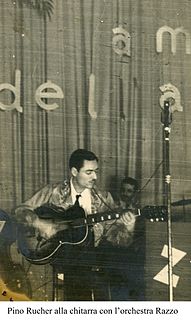
Domenico Modugno was an Italian singer, actor and, later in life, a member of the Italian Parliament. He is known for his 1958 international hit song "Nel blu dipinto di blu", for which he received Grammy Awards for Record of the Year and Song of the Year. He is considered the first Italian cantautore.

Chesney Henry "Chet" Baker Jr. was an American jazz trumpeter and vocalist. He is known for major innovations in cool jazz that led him to be nicknamed the "Prince of Cool".

Mina Anna Maria MazziniOMRI, Mina Anna Quaini, known as Mina Mazzini or simply Mina, is an Italian-Swiss singer and actress. She was a staple of television variety shows and a dominant figure in Italian pop music from the 1960s to the mid-1970s, known for her three-octave vocal range, the agility of her soprano voice, and her image as an emancipated woman.

Maria Ilva Biolcati, OMRI, known as Milva, was an Italian singer, stage and film actress, and television personality. She was also known as La Rossa, due to the characteristic colour of her hair, and additionally as La Pantera di Goro, which stemmed from the Italian press having nicknamed the three most popular Italian female singers of the 1960s, combining the names of animals and the singers' birth places. The colour also characterised her leftist political beliefs, claimed in numerous statements. Popular in Italy and abroad, she performed on musical and theatrical stages the world over, and received popular acclaim in her native Italy, and particularly in Germany and Japan, where she often participated in musical events and televised musical programmes. She released numerous albums in France, Japan, Korea, Greece, Spain, and South America.

Gino Paoli is an Italian singer-songwriter. He is a seminal figure who has written a number of songs widely regarded as classics in Italian popular music, including: "Il cielo in una stanza", "Che cosa c'è", "Senza fine", "Quattro amici al bar" and "Sapore di sale".

Roberto Gatto is an Italian jazz drummer, born October 6, 1958 in Rome.

Jimmy Fontana was an Italian actor, composer and singer-songwriter. Two of his most famous songs are "Che sarà", performed also by José Feliciano with Ricchi e Poveri and "Il Mondo".

Iva Zanicchi is an Italian pop singer and politician. She has a mezzo-soprano voice and is described as "a sort of white-skinned Italian Dionne Warwick".

Nico Fidenco is an Italian singer and film soundtrack composer who gained considerable popularity from 1960 onwards with the release of the song "What a Sky", taken from the film Silver Spoon Set by Francesco Maselli.

Umberto Bindi was an Italian singer-songwriter. He is especially known for the popular song he co-wrote with Gino Paoli, Il Mio Mondo, which he recorded in Italian in 1963. It was later performed by singers in English and other languages.

Chet Is back! is a 1962 studio album by jazz musician Chet Baker.
Forum Music Village is a recording studio located in Rome, Italy underneath the Sacro Cuore di Maria. It was founded by Ennio Morricone, Armando Trovajoli, Luis Bacalov and Piero Piccioni with the studio manager and producer Enrico De Melis in 1969. The studio has some peculiarities one of them is the ability to record a church organ directly to the studio.

Tony Renis, stage name of Elio Cesari, is an Italian singer, composer, music producer and film actor.

Pino Rucher was an Italian guitarist active in orchestral settings and in film soundtracks.

"Chetty's Lullaby" is a 1962 jazz song composed by Chet Baker. The song was released as a single in 1962 in Italy.
Anna Maria Ramenghi is an Italian singer.

"Motivo su raggio di luna" is a 1962 jazz song composed by Chet Baker. The song was released as a single in 1962 in Italy.

"So che ti perderò" or "I Know I Will Lose You" is a 1962 jazz song composed by Chet Baker. The song was released as a B side single in 1962 in Italy.















